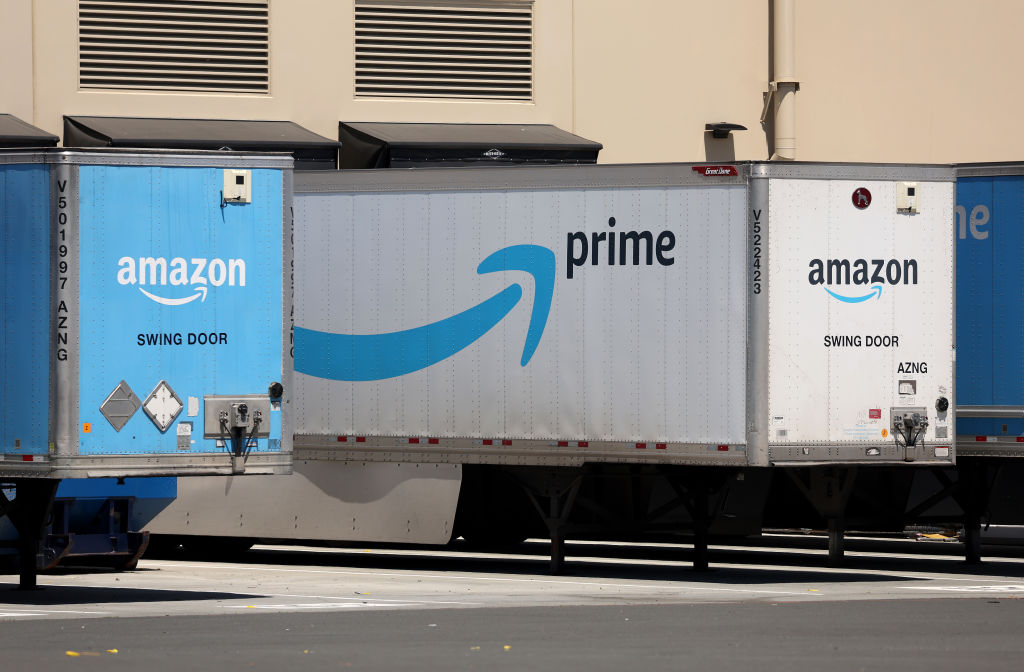Amazon, the 'everything store,' goes to court
Does the retail and tech giant actually have a monopoly or is that argument a bit of a stretch?

A free daily email with the biggest news stories of the day – and the best features from TheWeek.com
You are now subscribed
Your newsletter sign-up was successful
The smartest insight and analysis, from all perspectives, rounded up from around the web:
If you want to understand the big Amazon antitrust trial that started last week, said Dave Lee in Bloomberg, start with a small section of Amazon’s website: the “Buy Box.” That box, on the right side of the screen, “displays just one seller at a time.” When there are multiple sellers for an item, that essentially makes one the default, and Amazon says it goes to the cheapest and best-reviewed sellers. Behind the scenes, however, Amazon actually prioritizes the Buy Box for “sellers that store their goods in Amazon warehouses and use Amazon trucks to deliver their products.” Its fees for doing so have risen 30% since 2020. The Federal Trade Commission argues that Amazon also punishes “sellers that offer cheaper prices elsewhere by denying them the Buy Box,” incentivizing them to keep prices high. That’s an example of Amazon causing consumer harm — a pivotal antitrust hurdle.
FTC chair Lina Khan “made her name in Washington by writing a withering legal broadside against Amazon” for the Yale Law Journal in 2017, said Dave Michaels in The Wall Street Journal. She argued that Amazon “slashed prices so low that it lost money but rivals couldn’t compete,” a form of anti-competitive behavior known as predatory pricing. It was a novel approach that made waves in academic circles. But in court, Khan must turn that argument “on its head,” and show that Amazon hurts not just rivals but also consumers. The FTC now says Amazon “reaps the fruits of monopoly” because it punishes retailers for offering discounts elsewhere, raising prices across the retail landscape.
The Week
Escape your echo chamber. Get the facts behind the news, plus analysis from multiple perspectives.

Sign up for The Week's Free Newsletters
From our morning news briefing to a weekly Good News Newsletter, get the best of The Week delivered directly to your inbox.
From our morning news briefing to a weekly Good News Newsletter, get the best of The Week delivered directly to your inbox.
The case changed because Amazon has changed, said Cory Doctorow in The New York Times. “In its early years, Amazon was good to its users. It sold products affordably and shipped them swiftly and reliably.” But it has grown into “a retail colossus, barely hindered by either competition or regulation, where prices go up as quality goes down.” Our antitrust laws, before they were stripped of almost all meaning during the Reagan era, “were fashioned specifically to guard against this overwhelming corporate power.” Khan is courageous enough to engage “in the honorable and necessary business” of fighting this power on our behalf.
But how, exactly, is this supposed monopoly squeezing consumers? asked Tae Kim in Barron's. Take away its cloud-computing division and Amazon lost $10.6 billion last year. If it were as dominant in e-commerce as the FTC alleges, “wouldn’t the company be generating a large stream of profits?” Amazon may be the biggest online store, but it still has only a “single-digit slice” of U.S. retail spending, said Farhad Manjoo in The New York Times. The FTC says Amazon dominates the markets for “online superstores” — a category basically limited to Walmart, Target, and eBay. Brick-and-mortar stores are excluded. So are Best Buy, Home Depot, and Costco. This is gaming the definition. It’s “like citing Chipotle’s dominance in the choose-your-ingredients burrito business” and ignoring all the rest of fast food. We’ve seen real monopolies before, like AT&T in the 1980s or Microsoft in the 1990s. Amazon doesn’t look like those.
This article was first published in the latest issue of The Week magazine. If you want to read more like it, you can try six risk-free issues of the magazine here.
A free daily email with the biggest news stories of the day – and the best features from TheWeek.com
-
 The environmental cost of GLP-1s
The environmental cost of GLP-1sThe explainer Producing the drugs is a dirty process
-
 Greenland’s capital becomes ground zero for the country’s diplomatic straits
Greenland’s capital becomes ground zero for the country’s diplomatic straitsIN THE SPOTLIGHT A flurry of new consular activity in Nuuk shows how important Greenland has become to Europeans’ anxiety about American imperialism
-
 ‘This is something that happens all too often’
‘This is something that happens all too often’Instant Opinion Opinion, comment and editorials of the day
-
 Currencies: Why Trump wants a weak dollar
Currencies: Why Trump wants a weak dollarFeature The dollar has fallen 12% since Trump took office
-
 Elon Musk’s starry mega-merger
Elon Musk’s starry mega-mergerTalking Point SpaceX founder is promising investors a rocket trip to the future – and a sprawling conglomerate to boot
-
 TikTok: New owners, same risks
TikTok: New owners, same risksFeature What are Larry Ellison’s plans for TikTok US?
-
 Will SpaceX, OpenAI and Anthropic make 2026 the year of mega tech listings?
Will SpaceX, OpenAI and Anthropic make 2026 the year of mega tech listings?In Depth SpaceX float may come as soon as this year, and would be the largest IPO in history
-
 Leadership: A conspicuous silence from CEOs
Leadership: A conspicuous silence from CEOsFeature CEOs were more vocal during Trump’s first term
-
 Ryanair/SpaceX: could Musk really buy the airline?
Ryanair/SpaceX: could Musk really buy the airline?Talking Point Irish budget carrier has become embroiled in unlikely feud with the world’s wealthiest man
-
 Powell: The Fed’s last hope?
Powell: The Fed’s last hope?Feature Federal Reserve Chairman Jerome Powell fights back against President Trump's claims
-
 Taxes: It’s California vs. the billionaires
Taxes: It’s California vs. the billionairesFeature Larry Page and Peter Thiel may take their wealth elsewhere